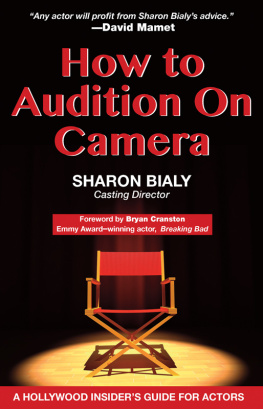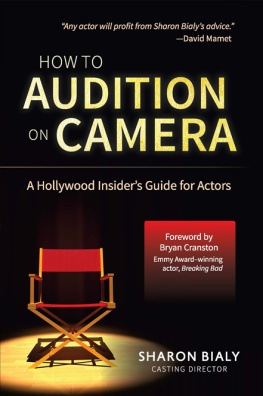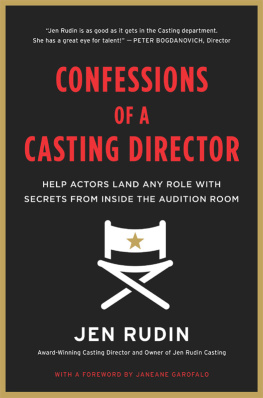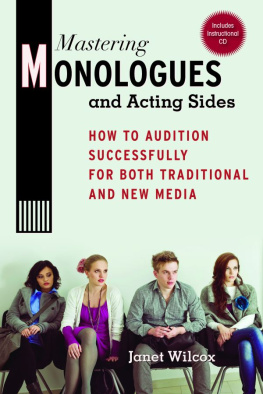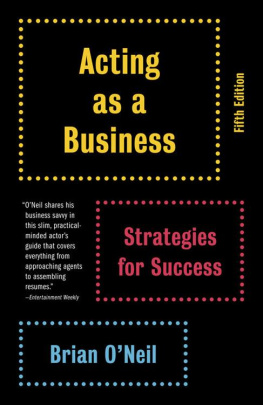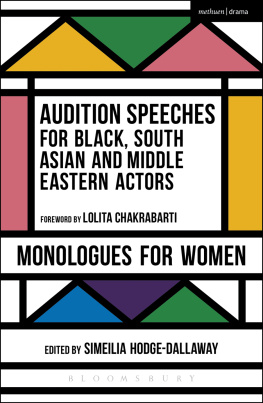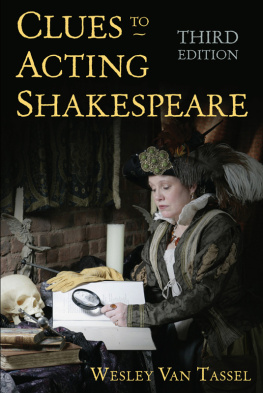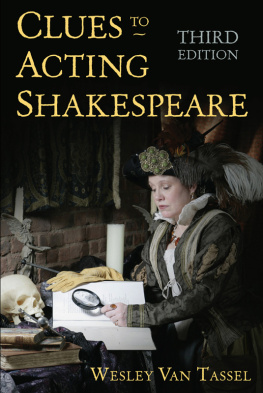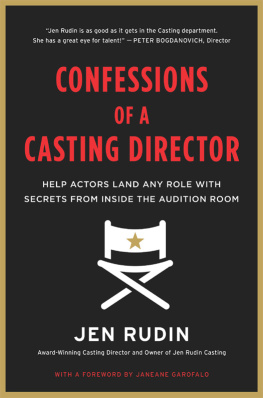An Actors
Guide to
Getting Work
Fourth Edition
Simon Dunmore

More than a practical guide through the terrors of the audition minefield, Mr Dunmores book is so positive and encouraging in its approach that it must be essential reading for any actor setting out on this perilous career.
If its true that Luck gets you there; talent keeps you there, then Mr Dunmore goes a long way towards explaining the mystery of luck.
Maggie Smith
Fourth edition 2004
Reprinted 2005, 2007
A & C Black Publishers Limited
38 Soho Square
London W1D 3HB
www.acblack.com
ISBN: 9780713668223
2004, 2001, 1996, 1991 Simon Dunmore
Third edition 2001
Second edition 1996
First edition published 1991 by Macmillan Publishers Ltd
A CIP catalogue record for this book is available from the British Library.
All rights reserved. No part of this publication may be reproduced in any form or by any means
graphic, electronic or mechanical, including photocopying, recording, taping or information
storage and retrieval systemswithout the written permission of A & C Black Publishers
Limited.
This book is produced using paper that is made from wood grown in managed, sustainable
forests. It is natural, renewable and recyclable. The logging and manufacturing processes conform
to the environmental regulations of the country of origin.
Typeset in l0pt on 11 pt Sabon
Printed in Great Britain by
Creative Print and Design (Wales), Ebbw Vale
Contents
Several actors, agents and directors read early drafts of this book and made numerous helpful suggestions, most of which I incorporated into the final draft. There was one major criticism which I finally decided to reject: Directors do not seem to come out of this terribly well. I do not exempt myself from what charitably might be called eccentric behaviour in the casting process. I have made mistakes some examples are cited in what follows and I have watched other directors do likewise. (The same is true of some decisions made by many casting directors and agents.) To some extent this eccentricity can be excused by the pressures on time that dominate our working lives. But not entirely. Like all human beings, directors have their prejudices. Much of the advice given in this book is how to avoid such prejudices being exercised so that you can get closer to the ideal to be judged on the basis of your talent as an actor and not rejected on apparently unfair or irrational grounds.
I dont think its just directors who do not come out of this terribly well. Those who read the manuscript were amazed at how stupid some actors seem to have been. You, the actor, can be responsible for your failures through lack of attention to minor but important details which can colour our whole perception of you. Consider the following analogy. Once a production is designed and cast, and the essential ideas behind it have been communicated properly to everyone involved, the creative part of the directors job is well on the way to being completed. What remain are the details. Those time-consuming details can make or break a production in the eyes of its audience. The same is true for an actor in quest of work in the eyes of the employment-brokers. You can help yourself by attention to peripheral details (for example, spelling and grammar in your letters) as well as to the central art of acting.
Ive learned a lot more practical realities in the 15 years since I started writing the first edition of this book. The intervening years have considerably sharpened my awareness of good (and bad) sales technique especially through my work with students. Ive also had the chance to experiment and refine and develop my ideas. The previous and this fourth edition have also benefited from the facility to ask questions and debate issues over the Internet. Ive made many new friends, with similar concerns, all over the UK and in North America a number of whom have been extremely helpful.
There are numerous people whom I would like to thank for their contributions and comments. First, I must thank all the students, teachers, actors, directors, casting directors, agents and all the other professionals Ive ever met; you have each given something to this book. Second, a special thanks to the following who cheerfully allowed me to pick their brains. John Ainslie, Laura Albery, Mark Allen, Pat Armitage, Iain Armstrong, Adele Bailey, Osian Barnes, Laurie Bates, Sophy Boreham, John Bowler, Carole Boyd, Chris Bramwell, Tracey Briggs, Robin Browne, Alex Caan, Amanda Caswell-Robinson, Jacquie Charlesworth, Mary Churchward, Roy Civil, Martin Cochrane, John Colclough, Ruth Cooper, Tim Crouch, Angus Deuchar, Stephen Douse, Katie Draper, Alan Dunnett, Richard Evans, Nicky Furre, Marsha Gorbett, Louise Grainger, Tina Gray, Bob Hamlin, Vicky Hasted, Jan Haydn Rowles, Chris Hocking, Phillip Hoffman, Ed Hooks, Bill Hughes, Cameron Jack, Anna Koutelieri, Beccy Lamb, Sarah de Larrinaga, lain Lauchlan, Steve Lawrence, Maggie Lloyd-Williams, Nichola McAuliffe, Peter McCarthy, Elizabeth McKechnie, Sally Marshall, Mike Maynard, Terry Meech, Peter Messaline, Richard Moore, Alex Nash, Janet Nelson, Tom Nordon, Pilar Orti, Andrew Piper, Mark Pitt, Fiona Power, Janet Rawson, Rachael Rena, Hannah Rothman, Denni Sayers, Nigel Seale, Nik Simmonds, Guy Slater, Sharon Small, Amy Stoller, Alison Taffs, Barbara Thompson, Jude Tisdall, Chris Wallis, Malcolm Ward, Eric Watson, Liz Whiting, Tana Wolf, Peter Yapp and Lesley Young. Third, similar thanks to those who contributed but preferred their input to remain confidential. Fourth, enormous thanks to the following who not only gave me insights but whose especial contribution deserves separate mention: Tim Bentinck, Don Gilt, Wyn Jones, Stephanie Pack and Michael Tucker. Fifth, apologies and many thanks to anybody Ive inadvertently missed out of these credits. Sixth, many thanks to my original editor, Susanna Wadeson, for the wonderful final coat of clarity she gave to my first manuscript and to Dame Maggie Smith for her generous endorsement.
Id also like to remember two actors especially, who not only helped me, but also cared deeply about the profession: Bert Parnaby and Nicholas Geake. Bert, in his guise as a senior inspector of education, was a towering support to the Theatre-in-Education movement in the 1970s and latterly (in his retirement job as an actor) gave me useful insights for this book. Nick read the final draft of the first edition; his only comment was, This is what has taken me nearly 20 years to learn.
Finally, I am indebted to my wife, Maev Alexander, who not only contributed to the content but also read every draft and told me when I wasnt being clear, as well as giving me house-room for my many hours at the computer.
I have spent over 30 years directing all kinds of productions. In the course of this career I have met many thousands of actors, read tens of thousands of letters and CVs, looked at a similar number of photographs, and my right ear is permanently flattened by all those telephone calls. I have deposited a forest load of paper into the bin and felt guilty about the time wasted and money spent by the people I didnt even interview, let alone employ.
There are so many letters from individual actors and suggestions from agents to consider for each production that there simply isnt time to give each one much more than a cursory skim in the initial weeding-out process. Anybody attempting to read each and every letter and CV and to look at each photo with the full care and attention that its creator deserves would not have enough time left to interview any actors at all. I do not exaggerate.


